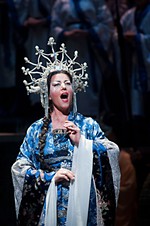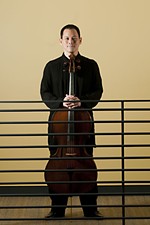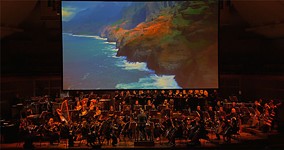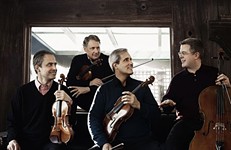Earthly Delights
Local Arts Reviews
Reviewed by Robi Polgar, Fri., Feb. 21, 2003
Earthly Delights: Feast of the Food of Love
First English Lutheran Church, Feb. 15
What was love like during the Baroque period? Well, if you take La Follia's array of musical selections as your guide, love was mystical, flamboyant, tense, otherworldly, foolish, impractical, sensual, dispiriting, raunchy, dizzying, tyrannical, desperate, and technical. Sounds no different from today, does it? Well, perhaps "technical" might not spring to mind, but playing Baroque tunes on any subject involves a certain palpable technical prowess. Baroque love music marries (or dates -- let's not get ahead of ourselves here) the troubadour tradition of wooing and pining for one's objet d'amour with spectacular technique in performance. If you can pull off a Baroque love song for your lady, nothing should stop you in your amorous advance.
La Follia -- Marcus McGuff, flute; Scott Horton, lutes; and Keith Womer, harpsichord -- were joined in their varied Cupidic onslaught by Barrett Sills on viola da gamba, a precursor of the modern cello, and soprano Jenifer Thyssen. For the most part, their musical arrows hit their marks, with some outstanding selections, especially those sung by Thyssen. Possessed of a voice that combines strength and precision, Thyssen handled the intense technical challenges of the music with seeming ease. But more than that, her often haunting delivery -- sometimes desperately soft, sometimes yearning and open -- really set the audience's imaginations ablaze. Michel Lambert's "Récit de la beauté" was one such haunting lament-laden selection; in two "wind" pieces -- Scarlatti's "Quel vento che d intorno" and Sances' "Cantat sopra la ciaconna" -- Thyssen and her male colleagues found the more playful, lilting side to love. The Sances piece, which concluded the first half of the performance, had a reality check in its upbeat tune: Suddenly, the building instrumentation and happy-go-lucky feel turned cold, with Thyssen dropping her voice for a moving, doleful finale. In the anonymous Scottish song "The Broom of Cowdenknowes," Thyssen's beautiful vocal storytelling was matched by the four musicians who built and ebbed their musical narrative to match the soprano in her cautionary tale of a Scottish lass.
Among the other musical selections, d'Hervelois' duet for viola da gamba and harpsichord, "La Milaneze," featured a masterful Sills. Similarly masterful was McGuff on flute, with Womer on harpsichord, performing the Sonata in G Major, Op. 1 by Handel. Having suffered the un-Baroque sounds of a passing fire truck, the Bach Sonata No.1 in G Major for Viola da Gamba and Harpsichord finally found its highly technical way to its dramatic conclusion with a fine Allegro Moderato.
Still, it's the interpersonal relationships that count in love. No matter how gifted the musicians, the four men tended to peer inward while playing. It was left to vocalist Thyssen to reach out to the audience with love's beautiful soundtrack from 300 years ago. Besides the Scottish tune, the evening's lyrical finale included Henry Purcell's "If Musik Be the Food of Love," which offered a rather modern-sounding, almost-pop-music flavor to a trio featuring lutenist Horton with Thyssen and Womer. And who could resist Arne's merry "Reasonable Libertine" that wound up the musical lovefest?










